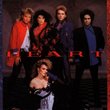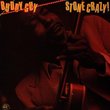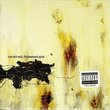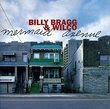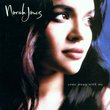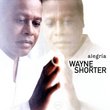| All Artists: Dun Tan, Muhai Tang, Kari Kropsu, Cho-Liang Lin, Kalevi Olli, Helsinki Philharmonic Orchestra Title: Tan Dun: Out of Peking Opera, for Solo Violin & Orchestra / Death & Fire, Dialogue with Paul Klee / Orchestral Theatre II: Re, for Divided Orchestra, Bass Voice & Audience with Two Conductors Members Wishing: 0 Total Copies: 0 Label: Ondine Release Date: 4/21/1998 Genre: Classical Styles: Opera & Classical Vocal, Forms & Genres, Concertos, Historical Periods, Modern, 20th, & 21st Century, Instruments, Strings, Symphonies Number of Discs: 1 SwapaCD Credits: 1 UPC: 761195086421 |
Search - Dun Tan, Muhai Tang, Kari Kropsu :: Tan Dun: Out of Peking Opera, for Solo Violin & Orchestra / Death & Fire, Dialogue with Paul Klee / Orchestral Theatre II: Re, for Divided Orchestra, Bass Voice & Audience with Two Conductors
CD DetailsSimilarly Requested CDs
|
CD Reviews3 tracs - each different Marian F. Grant | Spring Valley, CA United States | 09/24/2005 (5 out of 5 stars) "Musically I found the CD to be excellent. I am researching Paul Klee which was the motivation for buying this work. The 3rd trac was unusual to my ears but not atypical for Tan Dun." The more experimental side of Dun's output, showing his debt Christopher Culver | 08/12/2008 (3 out of 5 stars) "For all of Tan Dun's prominent role as a populist crowd-pleaser who delights audiences with East meets West crossover, there has always been that other side where his expression has been more concentrated and his knowledge of the Modernist tradition more overt. This Ondine disc, released in 1998, brings together three fairly early works that show Dun at his more violent. Muhai Tang leads the Helsinki Philharmonic Orchestra.
"Out of Peking Opera" for violin and orchestra (1987, rev. 1994) begins with a brief tune from a Chinese opera played by the soloist, but then immediately expands into a richly chromatic Western soundworld. The general mood is expressionist, perhaps comparable to the music of Wolfgang Rihm. Allusions to Dun's Chinese tradition are subtle: a single percussion sound here, a little pentatonic melody popping up among parts of the orchestra, or a fiddle-like inflection on the solo violin. Cho-Ling Lin, who performs here, was the dedicatee of the revised version. "Death and Fire" (1992) is a hommage to the painter Paul Klee, nine of its ten movements alluding to a specific work or general aspects of his art. This wide orchestral scope is often unfocused, and I find it a generally unremarkable piece, as colourful as the touches of nocturnal animals calls are. However, the following "Orchestral Theatre II: Re" (1992) is an unusual piece, to say the least. It is scored for bass voice, divided orchestra and two conductors. Initially the orchestral music develops on top of a D ("re" in solfege, hence the title) held by the bass before going off into similar evocative settings as "Death and Fire". At two points, the audience is called to participate, first humming the D along with the singer, and then chanting a faux-Chinese refrain. While I'd certainly love to see this in concert--I can't think of any other modern classical work where the audience can take part--it is less effective on disc. Still, it's good for a listen, and the gentle sound of splashing water at the end shows the beginnings of a soundworld that was to increasingly occupy Tan Dun in the following years up to today. None of this here is Tan Dun at his best, for which I'd recommend the multimedia cello concerto The Map (available on a Deutsche Grammophon DVD). Nonetheless, it proves that he is no lightweight in contemporary music and is capable of much more than just soundtracks and trendy operas." |

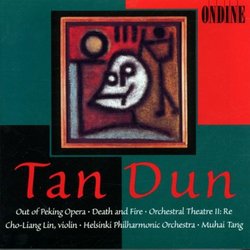
 Track Listings (12) - Disc #1
Track Listings (12) - Disc #1